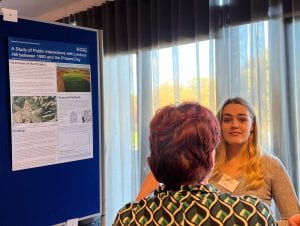 At the UROP Showcase this Wednesday, people from across the University and the wider community had the opportunity to learn about the work that 100+ students did as part of University of Reading’s Undergraduate Research Opportunities Programme, aka UROP. Each of the selected students was paid for a 6-week experience conducting real research for academics from across the University’s four themes. The three Classics projects noted below, working within the Heritage & Creativity theme, received funding and recruited select first- and second-year students to work with them. At the showcase each UROP student presented a poster explaining their research projects and discussed the results with interested persons.
At the UROP Showcase this Wednesday, people from across the University and the wider community had the opportunity to learn about the work that 100+ students did as part of University of Reading’s Undergraduate Research Opportunities Programme, aka UROP. Each of the selected students was paid for a 6-week experience conducting real research for academics from across the University’s four themes. The three Classics projects noted below, working within the Heritage & Creativity theme, received funding and recruited select first- and second-year students to work with them. At the showcase each UROP student presented a poster explaining their research projects and discussed the results with interested persons.
In the Company of Monsters: New Visions, Ancient Myths. Shona Carter-Griffiths (shown above) and Megan Davies worked with Profs. Emma Aston and Andrew Mangham (English) in preparation of the labels and text for their exhibition currently on display at the Reading Museum, which project uses contemporary visual art to investigate the power of ancient mythology to engage modern audiences and to explore contemporary themes of identity and diversity.
Athenian Festival ware in the Ure Museum Lorena Rodriguez-Tunon (shown right) collected and analyses examples in Reading’s Ure Museum of Greek Archaeology of black-figure ceramics created and used as festival ware in ancient Athens. This was a testbed for a larger project for which Prof. Amy Smith and her collaborator Dr Katerina Volioti (Roehampton) are currently seeking funding.
Public interactions with Lowbury Hill. Working with Summer Courts and Prof. Amy Smith on the Mymerian Project (https://research.reading.ac.uk/mymerian/), Georgia Spriggs (left) gathered, analysed, and interpreted trends in modern and contemporary public perceptions of the archaeology and history of Lowbury Hill, Oxfordshire, through research in archives and print media, in preparation of a journal article on the subject. Stay tuned for this and other outputs!
When we popped by the showcase we caught we caught Dr Sally Fletcher from the British Museum interrogating Shona and Megan, while Georgia was discussing her project with Janice Galvin from the Alumni Office: she was particularly interested in Georgia’s work on Lowbury Hill because this year the University Alumni funded Georgia’s work! We are very proud of grateful to our students and delighted that they all found their research work so fulfilling. The UROP calendar has just begun again and staff are encouraged to dream up exciting projects on which students might research in Summer 2024.






